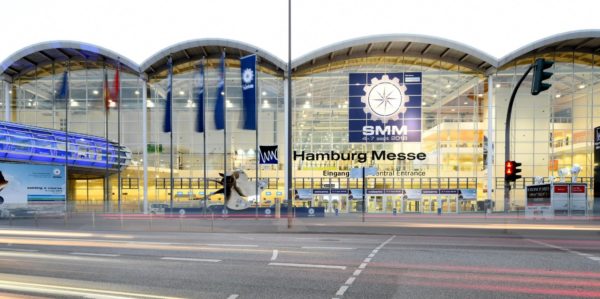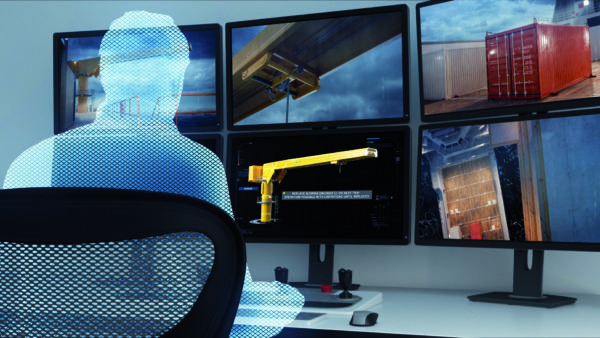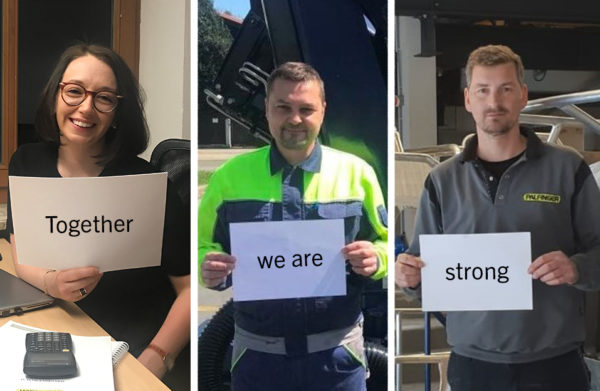The SMM in Hamburg is an event our industry very much looks forward to. Attending a leading trade show with tens of thousands of visitors and thousands of exhibitors is a highlight for the entire maritime community. Where else could one expect a more interesting (and passionate) dialogue about the issues we care most about? While we were all eagerly looking forward to the SMM last autumn, it soon became clear that the event would not be able to go ahead as planned due to the ongoing coronavirus pandemic. Postponing the trade show was, of course, the correct decision. The organizers had since decided to transform the SMM into a digital conference that took place between the 2nd and 5th of February 2021. It featured an open stream platform for presentations and interviews on topics that will shape the maritime industry in the near future.

© HMC / Michael Zapf: Hamburg Congress Center
PALFINGER is eager to contribute to the discussion, which is why we decided it would be worth taking a closer look at what we believe are the hot topics that will impact our industry most in the near future. To provide in-depth context, we asked Gunther Fleck, Vice President Sales & Service of PALFINGER’s marine business, to share his expert opinion on said topics.
Digitalization permeates the maritime sector
Digitalization is a global megatrend that impacts all industries, and it has been vastly accelerated by the pandemic. The maritime industry is increasingly preoccupied with determining what the “digital ship” of the future will look like. This new term combines a wide range of new concepts such as digital ship and fleet management, autonomous vessels, and artificial intelligence. While ships that utilize radars, sensors, and cameras to navigate independently sound like an intriguing prospect, this development also opens a whole new field of cybersecurity on the waters. Exciting times ahead…

The innovative PALFINGER jib cranes can be operated remotely from an onshore-control-cabin.
Gunther shares the excitement: “One of the most astonishing aspects is the progress of unmanned vessel development, especially as we are often labelled an ‘old-fashioned’ industry.” PALFINGER’s marine business actively contributes to digitization. We are in the process of developing SMART davits that will offer customers exciting new possibilities such as uninterrupted operative status monitoring. We have also developed fully electric jib cranes that can be operated remotely from a safe onshore location in harsh environments onboard unmanned installations. When human skills are required on location, our Smart Eye service solution allows us to assess issues through the eyes of on-site technicians, guiding them through relevant processes in real time.
Aspirations towards green shipping and sustainability
Our climate is changing, there’s no doubt about that. The negative impacts can already be felt across the globe and it’s time to act – and to act fast. Like every industry, the maritime sector is looking for ways to become more sustainable. The International Maritime Organization (IMO) has, for instance, committed to significantly reducing the industry’s CO2 emissions. One option that is regularly discussed is wind propulsion, a return to the roots of shipping. While wind conditions are too erratic for tight shipping schedules, modern sails can assist conventional ship engines and reduce emissions. In addition, there is the whole range of electric propulsion to consider. In short: hybrid systems are the future.
PALFINGER is proud to have contributed to a number of ground-breaking sustainability projects already. We have, for instance, equipped the Color Hybrid, the world’s largest plug-in hybrid ferry, with a complete package of lifesaving appliances (LSA) including four lifeboats and two fast rescue boats with accompanying davits. Last year, we went a step beyond by providing a Polar Code compliant LSA package to electric cruise liner Fridtjof Nansen. PALFINGER is committed to improving the sustainability track record of the maritime industry by working on innovative and contemporary solutions to integrate new and existing products into vessels with alternative propulsion systems, both hybrid and fully electric. Such sustainable milestone projects are close to Gunther’s heart: “I firmly believe that the maritime industry should increase its focus on the United Nations Sustainable Development Goals as a blueprint to achieve a better, more sustainable future for all.”
COVID-19 challenges the maritime industry to remain afloat
The COVID-19 pandemic is, without doubt, one of the most challenging events in recent history. It has disrupted almost every aspect of life as we know it, and the maritime industry is no exception. One thing has become abundantly clear: It is now, more than ever, crucially important to safeguard global supply chains. It therefore comes as no surprise that the IMO is eager to raise awareness of the seafarers’ vital role in world trade by selecting “Seafarers: at the core of shipping’s future” as the World Maritime Theme 2021. Keeping crews on vessels safe and healthy remains an enormous challenge, especially in times when restrictions prevent changing crews and condemn seafarers to even longer spells away from their homes and families. Let’s take a minute to appreciate the contribution these brave individuals make to everyday life.

PALFINGER motto throughout the COVID-19 pandemic: Together we are strong!
PALFINGER’s marine business reacted swiftly and decisively to the challenges posed by the pandemic. It goes without saying that we have made the health and well-being of our workforce and partners our highest priority while making every effort to keep our production, sales, and services up and running. Our service hubs remain available to anyone requiring assistance to this day, not least because of switching to home office where operational circumstances permit. Furthermore, the aforementioned Smart Eye remote assistance tool has proved invaluable for sharing know-how and expertise in real time. All these measures are encompassed in our motto for dealing with the pandemic: Together we are strong!
There is a light at the end of the tunnel as improved testing measures and vaccines are rolled out around the globe. We could all do with a bit of optimism in these trying times, and Gunther provides a healthy dose: “I believe that all stakeholders are making carefully considered, long-term strategic decisions during the pandemic, which is why I am quite positive about the future of the maritime industry. I expect a swift return to growth once the pandemic is over, at the very latest in 2023.”
